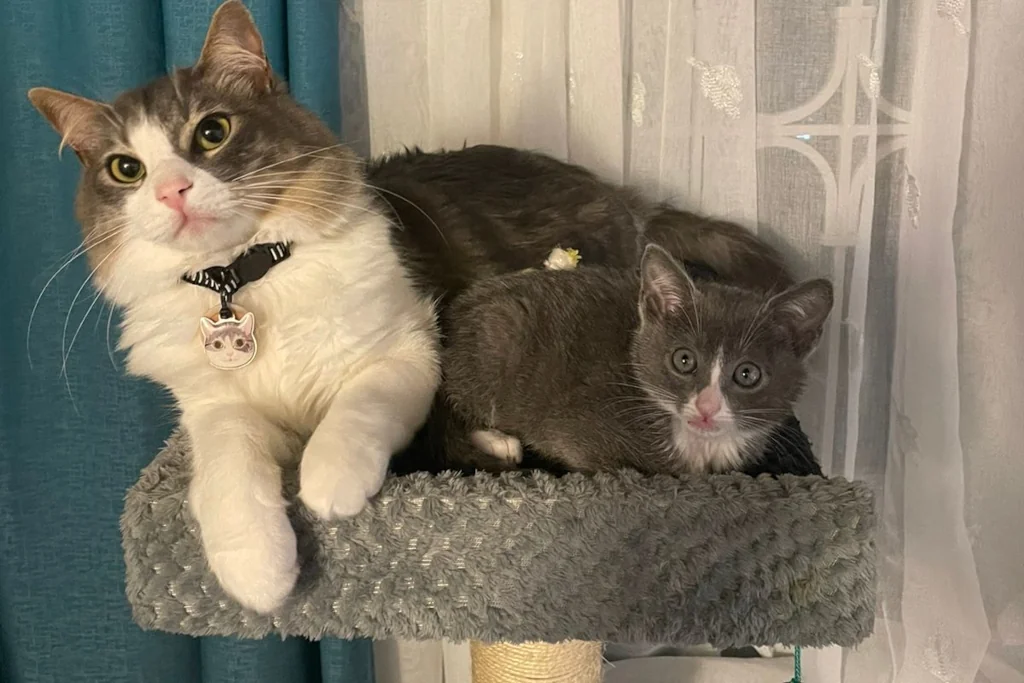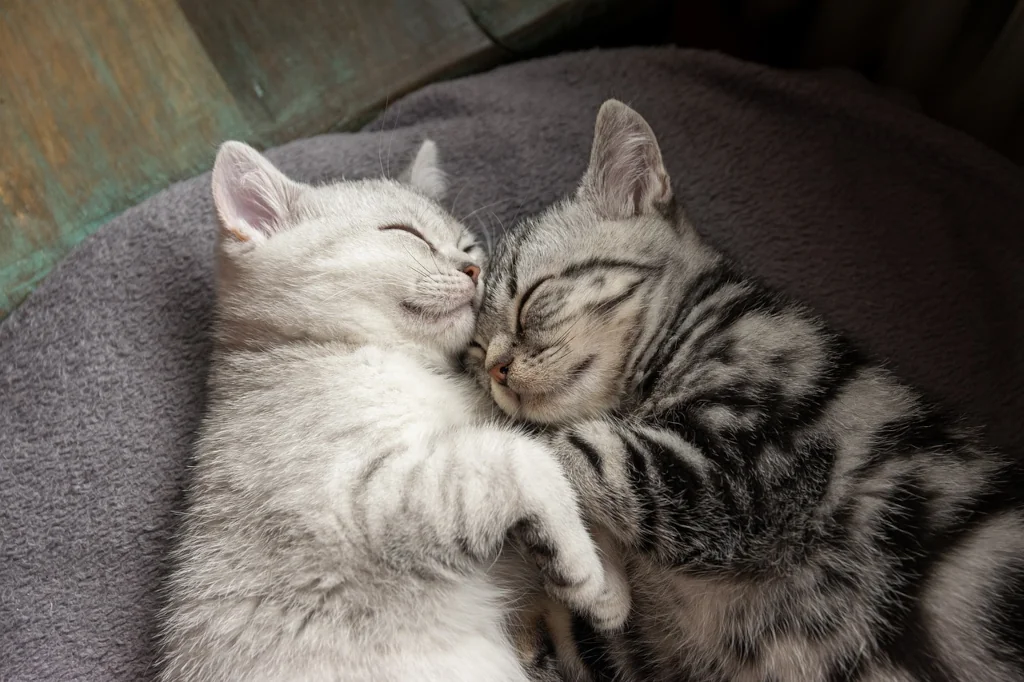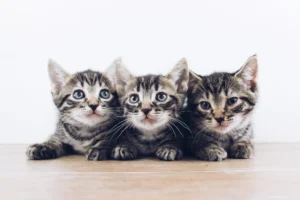Disclosure: We may earn a commission from helpful, relevant links in our content. No cost to you. See our privacy policy.
Ever feel like your cat is its own boss?
Like that furry friend of yours has a mind of its own, often aloof and indifferent? You’re not alone.
But here’s a little secret, cats crave interactions and bonding, just in their own unique way. That’s where socialization comes in, helping reveal the playful, curious side of your feline friend.
Both kittens and adult cats require socialization, and we understand it can seem like a puzzle at times. Stick with us, though. We’ve got your back on this journey, turning what feels like guesswork into a rewarding adventure.

Where to Start With Socializing Kittens?
When you start socialization early, you have the advantage of working with your little one during their most formative weeks.
The golden socialization period for kittens is between two to seven weeks of age. This is the time when their little minds are most impressionable.
So, what can you do?
Begin by exposing them to a variety of experiences. From different types of toys and play to varied sounds and gentle handling – the key is diversity.
Make sure to keep all interactions positive.
Praise, treats, and gentle stroking go a long way in creating a positive association. Remember, this is your first step in shaping your kitten’s perception of the world. So make it fun, engaging, and rewarding for them.
When selecting toys for this process, consider items that stimulate various senses, such as:
- crinkle balls for sound,
- feather wands for movement, and
- textured chew toys for touch.
These toys are truly a game-changer, helping make your kitten’s socialization as enjoyable as it is effective.
Is Socializing an Adult Cat Different?
Socializing an adult cat is indeed a different ball game.
If you’re adopting an adult cat who hasn’t been socialized, you might be taking on a challenge. But don’t let that deter you. Just because they didn’t hit the socialization jackpot as a kitten, doesn’t mean they can’t learn to enjoy the company of others.
With adult cats, the process is more about changing existing perceptions rather than creating new ones. That’s where patience and understanding come into play.
The idea is to replace their negative associations with positive ones gradually.
This could mean offering them their favorite treat when they accept petting or keeping their interaction with a new person calm and positive. This, in turn, trains your cat to behave properly and is fostering good behavior.
Offering treats as a reward for positive interactions can speed up the process. We’ve had great success with Wellness Kittles Crunchy Natural Cat Treats, which come in a variety of flavors.
Here’s the key takeaway: No matter how daunting it may seem, it is possible to socialize an adult cat. It’s a slower process, sure, but equally rewarding.
So get ready to celebrate small victories because each step your feline friend takes towards becoming more social is a cause for celebration!
How to Deal With Setbacks During Socialization?
Dealing with setbacks during cat socialization can feel like a punch to the gut.
One day, you feel you’re making headway; the next, it seems like you’ve been transported back to square one. But remember, even minor progress is still progress.
Firstly, never resort to punishment during setbacks. It won’t solve the issue but will lead to trust issues instead. Maintain a positive approach and reinforce good behaviors with praise, petting, and treats.
Secondly, consider involving a professional. If setbacks persist, don’t shy away from seeking professional help, such as a pet behaviorist or a vet. They can help pinpoint any underlying issues and give guidance tailored to your cat’s personality and needs.
Thirdly, keep in mind that cats are creatures of habit. So, too much too soon can become overwhelming. Take baby steps. If your cat reacted poorly to a new guest, try introducing them again but in a calmer and more controlled environment.
And here’s a unique tip – leverage the power of scent! Cats communicate and understand the world primarily through their nose. An unfamiliar scent can be stressful.
So, try mixing scents to make new experiences less intimidating. Rub a soft cloth on your cat and then on the newcomer (a guest or a new pet). This mixed scent will make the newcomer feel less alien, easing your cat into acceptance.

What Are the Signs of a Socialized Cat?
Knowing the signs of a well-socialized cat can help you determine how far you’ve come in your cat socialization journey. Here’s what you should look for:
- Comfort Around New People or Pets. A socialized cat shows curiosity instead of fear when encountering a new face.
- Adapts to Various Environments. They are at ease with changes in their surroundings and can handle disruptions to their routine without undue stress.
- Shows Interest and Curiosity. A socialized cat is eager to explore their surroundings and engage in play.
- Responds Positively to Handling. They tolerate and even enjoy being touched and petted, especially in areas like their belly or paws, which are typically sensitive.
- Plays Well With Others. A well-socialized cat understands the rules of play and rarely resorts to aggression.
Remember, the path to socialization looks different for every cat. They have their unique pace, comfort zones, and ways of showing progress.
The key is to celebrate the milestones, however small, and be patient, kind, and understanding throughout this journey.
Making Socializing Fun for Your Cat
Socializing your cat doesn’t have to be a tedious process. In fact, it can be an enjoyable bonding activity if you know how to make it fun for your furry friend.
One method that has always worked for me and my cat Smokey is turning socialization exercises into a game.
Take, for example, the day when I introduced Smokey to a new scratching post. He was quite wary of it at first, probably because of its unfamiliar scent and imposing height. Instead of forcing him to interact with it, I turned it into a game.
I hung some of his favorite toys from the top, enticing him to reach for them. In the process, he got familiar with the post, and soon enough, it became one of his favorite spots in the house. Now he can’t pass by without leaving a few marks, a clear win in the world of cat socialization.
There you have it. Socialization doesn’t have to feel like an imposition on your cat. Treat it as an opportunity to enrich their world and yours while strengthening the bond you share.
FAQ
Socializing adult cats can indeed be a challenge, but it’s not impossible. Patience, consistent positive reinforcement, and a slow, steady approach can yield surprising results.
The first step in socializing a kitten is introducing them to a variety of people, pets, and environments. This encourages them to be comfortable and confident with new experiences.
Certain cat breeds like Maine Coons, Siamese, and Ragdolls are generally more sociable and receptive to socialization. However, individual temperaments vary, so try to base your approach on your cat’s personality, not breed.
The length of the socialization process can take anywhere from a few weeks to several months, and sometimes even longer. The time it takes to socialize a cat can vary depending on the cat’s age, temperament, and past experiences.
Alex, a passionate animal lover, has experience in training and understanding animal behavior. As a proud pet parent to two dogs and three cats, he founded AnimalReport.net to share insights from animal experts and expand his knowledge of the animal kingdom.




